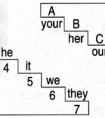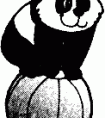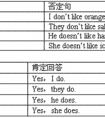It'sabeautifulcard.Ithinkmyyoungersisterwilllikeit.SoIwanttosend__________.[ ]A.itatherB.ittoherC.ittohim-五年级英语
题文
| It's a beautiful card. I think my younger sister will like it. So I want to send __________. |
|
[ ] |
| A. it at her B. it to her C. it to him |
答案
| B |
据专家权威分析,试题“It'sabeautifulcard.Ithinkmyyoungersisterwilllikeit.SoIwan..”主要考查你对 人称代词,介词 等考点的理解。关于这些考点的“档案”如下:
人称代词介词
考点名称:人称代词
人称代词:
代词是为了避免重复,用来代替前面提到过的人、动物、事物名称的词。人称代词主要用来指人,也能用来指物。人称代词分主格和宾格。人称
单数
复数
主格
宾格
主格
宾格
第一人称
I
me
we
us
第二人称
you
you
you
you
第三人称
he
him
they
them
she
her
it
it
- 人称代词主宾口诀:
人称代词分主/宾,只有八对要区分。
你(们)、它主/宾同一形,其余主/宾须分清。
谓语之前主格填,动/介之后宾格跟,
口语运用最灵活,表语也可用宾格。
人称代词并列现,注意顺序礼貌见,
二一、三一、二三一,第一人称最谦虚,
若把错误责任担,第一人称须当先。
考点名称:介词
- 介词:
是用来表示它后面的名词(代词)或起名词作用的短语、从句与句中其他成分之间的关系。
介词是英语中很活跃的词,一般置于名词之前。它常和名词或名词性词语构成介词短语。
同一个介词常和不同的词语搭配形成固定搭配,表示不同意义。 介词分类:
一、表示地点位置的介词
(1)at, in, on, to, for
at 表示在小地方;表示“在……附近,旁边”。
in 表示在大地方;表示“在……范围之内”。
on 表示毗邻,接壤,“在……上面”。
to 表示在……范围外,不强调是否接壤;或“到……”。
(2)above, over, on 在……上
above 指在……上方,不强调是否垂直,与below相对;
over 指垂直的上方,与under相对,但over与物体有一定的空间,不直接接触。
on 表示某物体上面并与之接触。
例:The bird is flying above my head. 小鸟在我的头上飞。
There is a bridge over the river. 在河上有一座桥。
He put his watch on the desk.他把他的表放在了桌子上。
(3)below, under在……下面
under 表示在……正下方
below 表示在……下,不一定在正下方
例:There is a cat under the table. 桌子底下有一只猫。
Please write your name below the line. 请在横线下写上你的名字。
(4)beside,behind beside 表示在……旁边
behind 表示在……后面
二、表示时间的介词
(1)in,on,at在……时
A、in表示较长时间,如世纪、朝代、时代、年、季节、月及一般(非特指)的早、中、晚等。
如:inthe1950s, in1989, insummer, inJanuary, inthemorning等。
B、on 表示具体某一天及其早、中、晚。
如:on May 1st, on Monday, onNew Year’s Day, on a cold night in January, on a fine morning, on Sunday afternoon等。
C、at 表示某一时刻或较短暂的时间,或泛指圣诞节,复活节等。
如:at 3:20, at this time of year, at the beginning of, at the end of, at the age of, at Christmas, at night, at noon, at this moment等。
(2)after在……之后 “after+一段时间”表示过去的一段时间以后;
“after+将来的时间点”表示将来的某一时刻以后。
三、其它常用介词
(1)about关于,附近,大约,周围,随身.
I have bought a book about Shakespearean. 我买了一本有关莎士比亚的书。
There are about fifteen trees in the picture. 大约有十五棵树在图片里。
(2)across横过,对面,交叉,在……的对面
Can you swim across the river? 你能游过河吗?
We live across the street. 我们住在街的对面。
- 最新内容
- 相关内容
- 网友推荐
- 图文推荐
| [家长教育] 孩子为什么会和父母感情疏离? (2019-07-14) |
| [教师分享] 给远方姐姐的一封信 (2018-11-07) |
| [教师分享] 伸缩门 (2018-11-07) |
| [教师分享] 回家乡 (2018-11-07) |
| [教师分享] 是风味也是人间 (2018-11-07) |
| [教师分享] 一句格言的启示 (2018-11-07) |
| [教师分享] 无规矩不成方圆 (2018-11-07) |
| [教师分享] 第十届全国教育名家论坛有感(二) (2018-11-07) |
| [教师分享] 贪玩的小狗 (2018-11-07) |
| [教师分享] 未命名文章 (2018-11-07) |



![Whatisshedoing?[ ]A.Shereadsbooks.B. Sheisreadingbooks.C. Heisreadingbooks.-四年级英语](http://www.00-edu.com/d/file/ks/4/1/22/2019-08-15/small4d54ac48424e1edca85c89a26f8ea0a81565798820.jpg)


